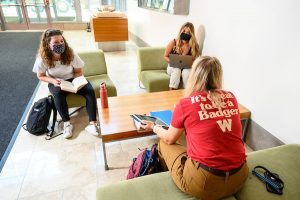
One of the places your students need to feel comfortable and secure — particularly when confronted with isolation or quarantine — is in their room or in their home. That can be hard if their roommate or others who share their home aren’t on the same page about healthy behaviors during COVID-19. Help your student start the conversation by sharing these tips from UW–Madison Student Affairs:
Prepare First
Before talking with their roommate, ask your student to think about or write down what is on their mind. What points of clarification or agreement would help them feel more comfortable right now? Do they want to talk about sanitizing commonly touched surfaces; expectations around having visitors; what to do if someone gets sick; or plan for a possible at-home quarantine? Let them know it’s okay not to talk about everything at once — but getting the conversation started can be make future discussions easier. Indiana University prepared this excellent discussion guide if your student would like a pre-made list of questions to use.
Find a Time
If your student already has a standing time to connect with their roommate, like a weekly dinner or Sunday check-in, that could be a good time to bring up COVID-19 precautions. If they don’t typically get together, they could start the conversation by saying something like, “Can we talk about COVID-19 and how to stay healthy this semester? If you want to take some time before we talk about this, that’s okay, or I’m ready to talk now if you want.”
Start the Conversation
One way your student can begin the conversation is by sharing the thoughts they prepared — telling their roommate what is on their mind and what questions or concerns they’d like to address.
Here are a few places to start:
- If one of us tests positive for COVID-19, how will we communicate this with the other?
- How do we feel about inviting friends or family into our living space or visiting others?
- Will we wash or sanitize our hands every time we return home or enter a common room from another location?
- In which situations do you wear a face covering and engage in physical distancing? Why or why not? (Remember that testing only reflects a point in time and shouldn’t be considered a reason not to wear a face covering or physically distance.)
Troubleshooting COVID Conversations
If your student’s roommate isn’t receptive to talking, encourage your student to reach out to a campus resource or someone they trust — you or other family members, their advisor, a health care provider, housefellow or the Dean of Students Office — for advice or ideas to open up the conversation and to help it go smoothly.
If your student lives in University Housing, have them review the FAQ page for additional resources and answers to COVID-19-related questions. There are specific guidelines around quarantine and isolation for students living in university housing and students living off campus.
The Parent and Family Program team is also here to support you as parents and family members. Reach out to our team with any questions or concerns.